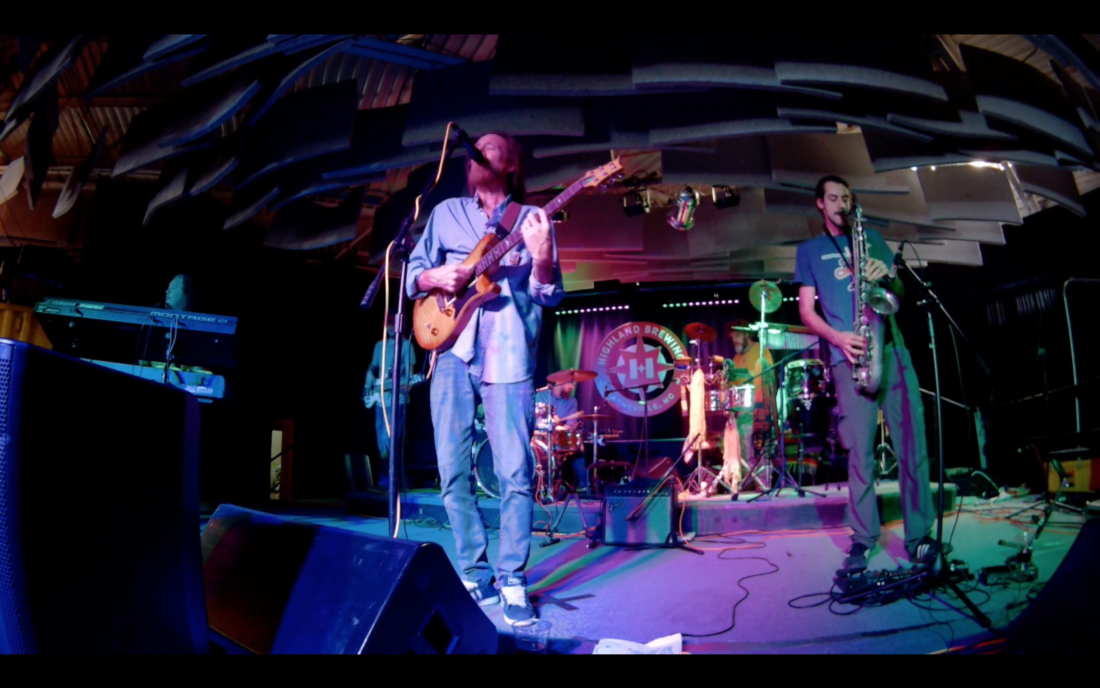The Streamside Music house concert series had been running on the outskirts of Asheville for most of a decade when the COVID-19 outbreak occurred. As host Sally Sparks witnessed her musician friends lose their gigs, “I thought, what if we could take the listening room experience and present it to people … online, to connect people and try to get some income for musicians?” she says.
Sparks teamed with Paul Huemiller (Dream Guitars), Clint Bernard (Unitarian Universalist Church of Asheville’s Acoustic Journeys) and Ryan Reardon (Asheville Music School) to create an online concert series called Keep Music Live Project.
Meanwhile, NewRootz Studio, a private recording facility in the Asheville area, had produced albums by such local bands as reggae collective Chalwa and instrumental funk outfit Blinding Standstill. Engineer J Ferris previously considered expanding the business’s reach, “but with everyone else jumping online and doing their streams, we were like, ‘We’ve got to launch it now,’” says Jason Hazinski, a member of Chalwa. Hazinski came on board to help with administration, from building a website to coordinating with bands in need of online opportunities.
“We’ll have our own stream on IamAVL,” Hazinski notes, referring to the local livestreaming video service mentioned in last week’s issue. At interview time, NewRootz was partnering with Highland Brewing Co. to continue livestreaming concerts from its taproom stage. (This and recording at NewRootz are currently on hold during the Stay Home-Stay Safe order, but archived footage is available to viewers.)
“Right away … we had three or four bands hit us up,” Hazinski says. Initial NewRootz shows were with The Snozzberries and Dirty Dead, each of which received around 2,000 views and yielded generous donations.
Streamside’s first concerts were by Al Petteway, Shane Parish and Trio Sefardi, with jazz guitarist Sean McGowan slated for Friday, April 10. All of the artists involved with that series agreed to avoid a paywall. “Just because somebody lost their income, we don’t want to say, ‘You can’t be with us,’” says Sparks. “Those who can kick in some money to these musicians, great.”
Aside from the virtual aspect, there are major differences between livestream concerts and live shows. There’s the need to treat the room as a sacred space in order to protect the equipment and prevent exposure to COVID-19 — a concern even with a limited number of people accessing the studio.
And there’s the shift from an in-the-flesh audience to a computer screen. “There’s a huge benefit to interacting … you can read comments [from] the feed,” Hazinski says. “It’s way different, getting used to not talking to anyone and coming as you are.”
“It’s important for people to be in a live situation and know other people are tuning in,” Sparks says of streaming concerts. “People really enjoy seeing their friends on the chatroom while they’re listening to the show.”
Learn more at newrootzstudio.com and streamsidemusic.wordpress.com.




Before you comment
The comments section is here to provide a platform for civil dialogue on the issues we face together as a local community. Xpress is committed to offering this platform for all voices, but when the tone of the discussion gets nasty or strays off topic, we believe many people choose not to participate. Xpress editors are determined to moderate comments to ensure a constructive interchange is maintained. All comments judged not to be in keeping with the spirit of civil discourse will be removed and repeat violators will be banned. See here for our terms of service. Thank you for being part of this effort to promote respectful discussion.